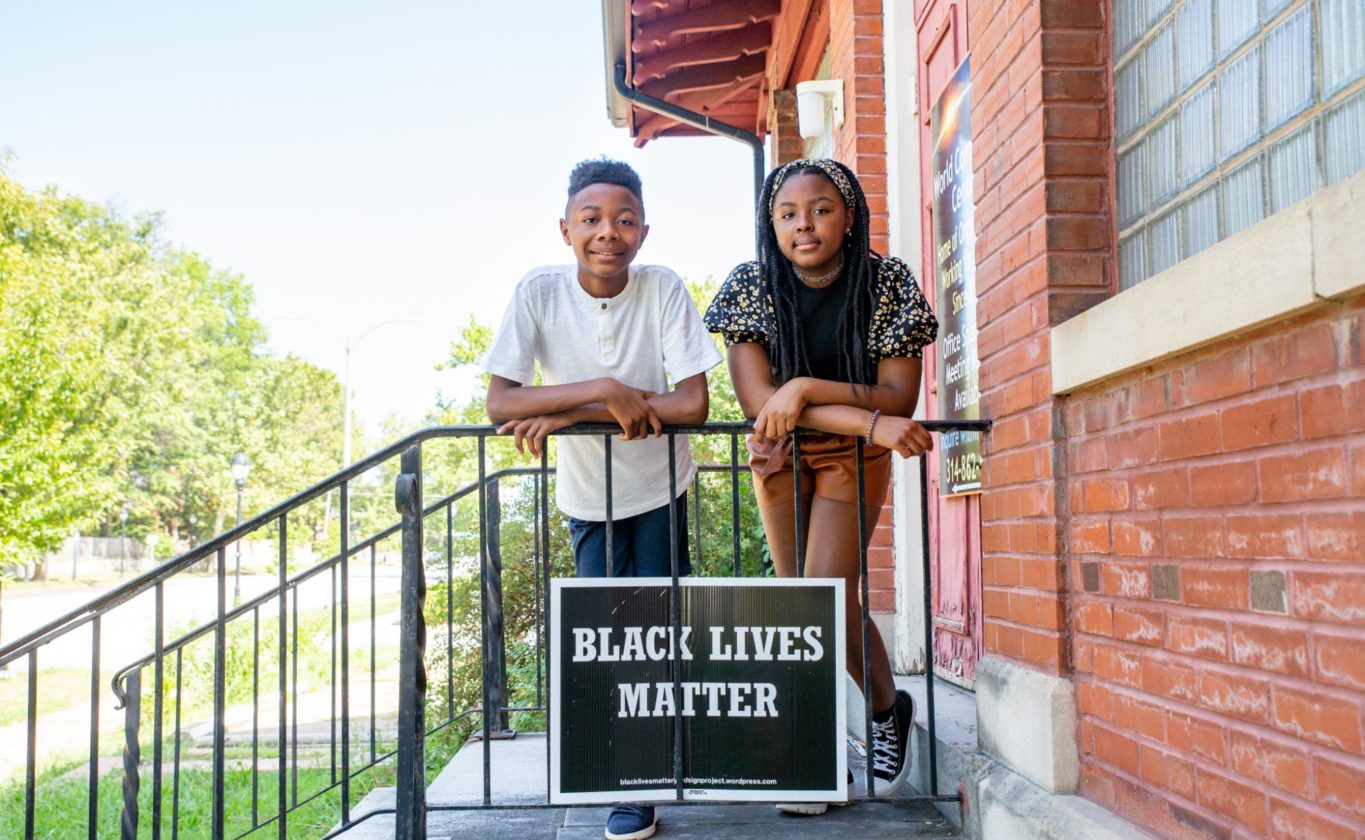Our 2021 5-part series, Barriers & Blessings—How Commercial Prosperity Shapes School Success, is a continuation of FTF’s Still Separate, Still Unequal advocacy tool for education equity in the St. Louis region.
The stories that we tell ourselves and that we pass on matter. They reflect and reinforce our beliefs, the decisions we make, and the actions we take. In our latest collaboration with Humans of St. Louis, we hear community voices share how stories of self have historically shaped the lives of St. Louisans and the education landscape we live in and how those stories continue to define us today.

Grace Griffin, American Friends Service Committee St. Louis Peace Program Youth Council Member, Photostory by Colleen O’Connell Smyth/Humans of St. Louis
Grace: I was told about the American Friends Service Committee (AFSC) Peace Program from members of my community. I went online and read some articles about what they do to spread awareness about racism and inequalities in urban communities. I live in East St. Louis, Illinois, and inequalities in housing and education are all problems in my community, too. I wanted to help abolish those injustices, so I became a member of the AFSC Youth Council. When I first joined, I was intimidated because most of the other members are in high school. My brother and I are the two youngest and I didn’t want them to think I was immature. But at every meeting we play get-to-know-you games, which has helped. I can tell I’m learning because I’m able to keep up with other members now and contribute to the conversation.
I’ve been in the program now for over a year and have made some really important relationships. At meetings, we discuss ideas or topics that are relevant to our experiences. Last time we were looking at stereotypes and systems in place to disadvantage Black people. We talk about pretty heavy topics, so if we’re lost, Joshua, the Program Director, gives examples to help us understand. This summer we had a three-day workshop learning about capitalism. The first day we were driving to visit my uncle who lives in Carbondale, but it was important to us so we Zoomed from the car.

Grace: Our mom has taught us we should never miss an opportunity to learn more about the world. She got us interested in social justice work because of conversations she has with us at home. Just being around her, we learn a lot. She’s getting her Ph.D. in American Studies at Saint Louis University. Her research focus is on African American women in the 19th and 20th centuries and food has been a big part of it because of Black women’s history of being in the kitchen. I like cooking and learning about the science and history behind it. I get exposed to that stuff because of her. Talking with my peers in school, a lot of them don’t have the same opportunities to learn about the history behind the things we eat. I think it’s a problem.

Grace and Yosiyah Griffin, American Friends Service Committee St. Louis Peace Program Youth Council Members, Photostory by Colleen O’Connell Smyth/Humans of St. Louis
Yosiyah: In my elementary school, there were metal detectors and it frustrated me. Walking through those on a regular basis in an environment where you are supposed to learn can have an impact on your brain and how you view your community. You begin to normalize a jail-like mentality. There were some days in class where I couldn’t focus and would just be consumed with thinking about metal detectors. Like, ‘Why do we need them?’ I could see it if there were visitors and parents, but kids should be allowed through a door without them.
Grace: Even then, it makes you view your community, even yourself, as criminal. Why would a parent come in to hurt anyone? It suggests parents and your community are evil. But that’s not the reality I know — I trust my community. Now I’m at a new school here in St. Louis and there are no metal detectors. It makes me ask, ‘Why do some areas have them and not others?’ We’ve been researching that question in the Peace Program. I think it adds to the school-to-prison pipeline mentality, the relationship between jail-like schools, higher suspension rates in urban communities, and their role in setting a path up for failure, especially for Black people.

Grace: Our job as Youth Council members is to spread awareness and organize events around the school-to-prison pipeline. Currently, we’re writing op-eds on specific problems we see in schools and how we can help solve them. I’m working on the relationship between food deserts in urban communities and how it affects the school environment. Nothing has really surprised me as I’ve been reading because I see it every day — how larger suburban areas have better-funded food programs as opposed to those in poorer or lower-income neighborhoods. East St. Louis doesn’t even have a full-service grocery store. We have to go to Fairview Heights instead.
Yosiyah: At my old school, the lunches were a problem, too. I noticed they tried to advertise them as healthy and balanced, but to me, what they served wasn’t what real food looks like. For example, a normal meal would be green beans and mashed potatoes with meat, but it would be overly processed and frozen. There are lots of messages that make us feel like we don’t matter as much — metal detectors, crappy food. I don’t see the same things at my current school and I think it’s better-funded because it’s private.

Close your eyes and imagine St. Louis 30 years from now, what would you want it to look like?
Yosiyah: When I’m older I want St. Louis to be a more peaceful place, where multiple communities can come together and celebrate each other’s differences. I imagine it being like a soup, where you need all of these key ingredients to make up a whole. They aren’t good on their own, but when you add them together it makes something wonderful.
Grace: A place where injustices like improper healthcare are gone. A place where everyone has better grocery stores — maybe even money to afford Whole Foods. Thirty years from now, better housing and basic human needs will be met, so we won’t have so much community violence and theft because of these injustices. It’s going to take a lot of work, but I’m willing to participate. I think a start is getting people like myself into this program.

